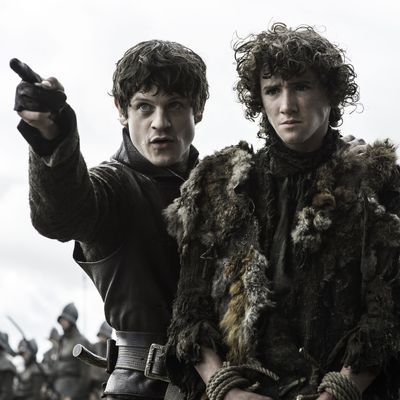
Major spoilers ahead for episode nine of Game of Thrones season six.
On Sunday night’s climactic episode of Game of Thrones, “The Battle of the Bastards,” Ramsay Bolton finally got what was coming to him: a brutal death by his own hungry hounds after losing the battle for Winterfell. (Always feed your dogs before going on a trip, pet owners!) Before he was unceremoniously eaten alive, Sansa had some parting words for the reigning Warden of the North: “Your words will disappear. Your house will disappear. Your name will disappear. All memory of you will disappear.” I hope so! Ramsay was a rapist and a murderer, a kinslayer and a skin-flayer; he was also, despite a spirited performance from Iwan Rheon, one of Thrones’ most dramatically inert characters. He will not be missed.
Ever since he was introduced at the beginning of season three, most Ramsay scenes have followed a similar pattern. Ramsay shows up and threatens to do something terrible. The show dangles the possibility that the terrible thing might not happen. Nope: The terrible thing does happen. It happened in his first appearance, when he pretended to help Theon escape from the Dreadfort, and it happened in his last, when he pretended to release Rickon before sending an arrow straight through his heart.
Okay, you might say, but Ramsay is a villain. That’s what villains do. Of course, we want our bad guys to be nasty, but most of Game of Thrones’ best villains have been more complicated than that. Joffrey was a sniveling little weenie granted great power. Littlefinger is an upjumped nerd that never got over high school. Walder Frey is an insecure status-grubber. Roose Bolton had a dark, dry wit even in the grimmest of times. That’s not to say you can never have villains that are one-dimensional — step forward, the Mountain — only that they’re best used sparingly. Like the shark in Jaws, there’s a reason we haven’t seen the White Walkers more than a handful of times over the course of the season. In and of themselves, they’re not that interesting.
What did make Ramsay interesting in retrospect was his relationship with his father. Ramsay was all id, Roose was all superego, and the duo’s scenes together were a Freudian feast of unsettled emotion. Though Roose’s surprising death made Ramsay the Lord of Winterfell, it was the worst thing that could have ever happened to his character. Stripped of his only interesting relationship, Ramsay popped up every few episodes to torture minor characters and coo maniacally, but he had very little to actually do.
That we still saw so much of him isn’t Ramsay’s fault, of course; it’s just a symptom of how shallow the show’s villain bench has become in the past few seasons. Joffrey is dead, Cersei is a protagonist, the Mountain is a zombie, and the Wildlings are now on the good guys’ side. We’ve still got the Sparrows and the masters in Meereen, but neither of them have quite worked as the writers might have hoped for. At least, according to next week’s preview, we’ve still got the Freys to kick around.
To some extent, this is by design: The show’s final episodes will center on the battle against the White Walkers, and it’s only sensible that the human villains will have to be winnowed down before then. But Ramsay’s death does leave a lot of screen time to be filled by the next bad guy; the smart money is on Euron Greyjoy, whom George R.R. Martin seems to be setting up as a major threat in The Winds of Winter. So far, show-Euron hasn’t quite lived up to the greatness of his first appearance, but all the ingredients for an interesting villain are there. At the very least, unlike Ramsay, he’s a character who hasn’t quite hardened into shtick yet.





